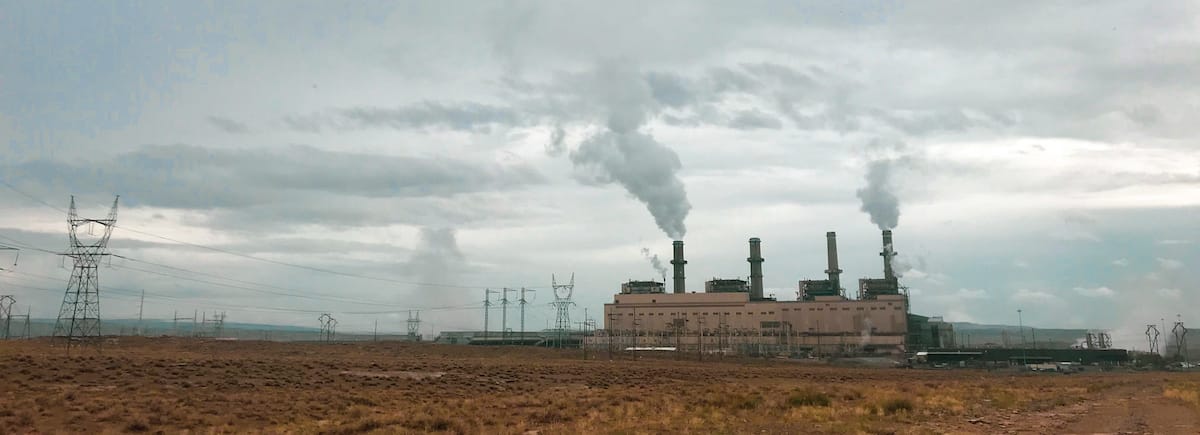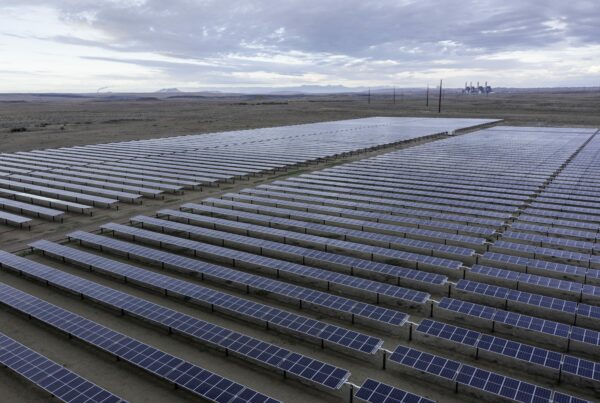The Four Corners region is on the cusp of a rapid transformation from coal to renewable energy. The massive coal-fired San Juan Generating Station near Farmington is slated for demolition later this spring, accompanied by the simultaneous construction of large utility-scale solar photovoltaic plants. The metamorphosis from 19th-century to 21st-century technology is breathtaking to behold.
The San Juan Generating Station was constructed 50 years ago, back in 1973, and generated 1,848-MW of electricity fueled by burning coal from the nearby San Juan coal mine. Half the power plant was closed in 2017, when the owners decided that was cheaper than installing modern pollution control equipment to reduce nitrogen oxides and sulfur dioxide contributing to regional haze.
Soon thereafter, the majority owners of the power plant, led by Public Service Company of New Mexico (PNM), announced intentions to permanently retire the remainder of the plant and replace it with renewable energy sources. Consequently, San Juan Generating burned its last shovel-full of coal in September 2022 and shut down after a half-century of operation.
Now, the plant’s owners are rapidly moving toward decommissioning and demolition. San Juan County, New Mexico, passed an ordinance requiring the demolition and removal of retired coal-fired power plants in order to prevent deterioration, groundwater contamination and other potential risks to public health and welfare. The plant’s owners already intended full reclamation, but the county’s ordinance placed a premium on prompt action.
PNM filed its decommissioning plan with the county in December. The plant’s innards are already on the auction block, and buildings and smokestacks could be demolished as soon as April. The entire reclamation process will take another couple of years.
Meanwhile, a solar development company, D.E. Shaw Renewable Investments, has approval to proceed with a 200-MW photovoltaic and 100-MW battery storage project called San Juan Solar Phase I. The solar project is located immediately northeast of the San Juan Generating Station on private land. Construction on the solar project is also expected to commence this spring, perhaps exactly as the coal-fired plant it is intended to replace is demolished. The solar energy will be purchased by PNM to replace the electricity previously produced by burning coal.
Other solar projects are under consideration in the immediate vicinity, including a second phase of the San Juan Solar project and another similar large-scale project adjacent to the coal plant on the west side referred to as Shiprock Solar.
A key consideration in New Mexico was to ensure that the replacement power projects were located in the same school district as the retiring coal-fired power plant. San Juan Generating Station provided the lion’s share of the property tax to the Central Consolidated School District in Kirtland. The solar projects will replace the several hundred million dollars in property value previously attributed to the coal plant, thereby diminishing financial impacts on the district.
The one-for-one swap of solar for coal crystallizes our region’s energy transformation. The solar projects re-use the coal plant’s existing electric substations and transmission lines to repower communities across New Mexico with an inexhaustible source of renewable solar energy.
The coal plant’s demolition and the solar project’s construction will bring about an immediate construction boom, but with several solar projects on the horizon, the associated construction jobs should extend for several years.
Two additional solar projects intended to replace electricity from San Juan Generating Station are already under construction in northwest New Mexico near Cuba. The Arroyo Solar Project is 300-MW of solar photovoltaic and 150-MW of battery storage, while the Jicarilla Solar Project provides 50-MW of solar with 20-MW of battery storage. Both should begin operating in May.
This content first published in the Durango Herald here.



